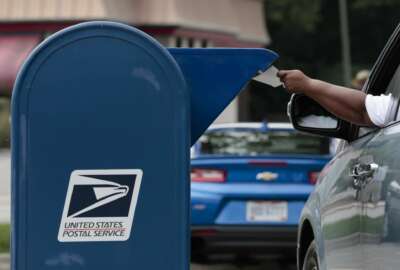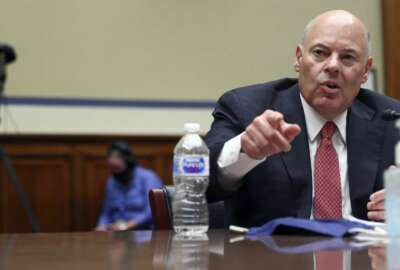
USPS operational changes had ‘significant impact’ on mail delays, watchdog finds
Auditors found on-time delivery of first-class mail fell by more than 10% in July, directly corresponding” with the timeline of when USPS started reducing late...
The Postal Service’s inspector general said operational changes implemented by Postmaster General Louis DeJoy and agency executives this summer met legal requirements, but took issue with the execution of those plans, and determined they led to delays in mail delivery.
The IG report released Tuesday took a closer look at three operational changes that went into effect soon after DeJoy took office in June:
- Eliminating late and extra trips between mail processing plants and post offices,
- A reorganization of headquarters and field operations, and
- A pilot implemented at nearly 400 facilities meant to get mail carriers on their routes sooner and reduce overtime.
“These initiatives undertaken individually may not have been significant,” auditors wrote. “However, launching all of these efforts at once, in addition to the changes instituted by the postmaster general, had a significant impact on the Postal Service.”
USPS officials estimated the work hours they would save with these initiatives, but the IG found the agency didn’t complete a study or analysis of the impact these changes would have on mail service — even though, as auditors stressed, the agency was going through “critical employee availability issues” because of the COVID-19 pandemic.
USPS Chief Operating Officer David Williams, according to the report, said he expected a temporary drop in mail delivery because significant changes were made in a short period of time, but told auditors that he expected a “sharp recovery.”
Another agency executive told the IG office that “achieving service and efficiencies are not mutually exclusive — we are expected to do both.”
More than 10,000 USPS employees have contracted COVID-19, and about 2,000 employees were out of work last month because of the coronavirus. The agency, which has more than 600,000 employees, has seen 91 employees’ deaths from the coronavirus.
The Postal Service has pushed back on many of these points. DeJoy told congressional committees this summer that the agency hasn’t taken any steps to cut overtime, and that the agency has significantly reduced late and extra truck trips, but hasn’t eliminated them.
Meanwhile, USPS has defended these operational changes in a dozen federal lawsuits. So far, judges in at least eight of those lawsuits have issued rulings or preliminary injunctions that have blocked these operational changes through next month’s election.
But before these court rulings went into effect, auditors found that on-time delivery of first-class mail fell by more than 10% in July, “directly corresponding” with the timeline of when USPS began reducing late and extra truck trips.
Auditors determined that USPS implemented these changes with little documentation or written guidance, and that instructions were handed down verbally, leading to “confusion and inconsistent application across the country.”
Based on interviews with management at 13 sites, the IG observed confusion about the official policy on overtime, handling and making late deliveries and whether to leave mail behind if it wasn’t ready for delivery each morning.
DeJoy has acknowledged dips in on-time delivery that have since improved. The on-time rate for first-class mail rebounded to more than 86% in September, but still remains below performance standards seen earlier this year— even during the height of the COVID-19 pandemic.
USPS executives, however, have pushed back on criticisms of recent management decisions, saying most of them are routine actions that also took place before DeJoy’s tenure. The agency also attributes some of the mail delays to an increase in employees taking sick leave during the COVID-19 pandemic.
Robert Duncan, USPS Board of Governors chairman, told the IG’s office that it reached an “erroneous conclusion” that DeJoy’s directive to run mail trucks on time, combined with ordinary operational actions, led to mail delays.
“The postmaster general has acknowledged that his emphasis on conforming to the transportation schedules revealed a disconnect between the processing machine schedules and the transportation schedules that resulted in unforeseen service issues, and those issues are being resolved,” Duncan said.
During back-to-back congressional hearings in August, DeJoy said cutting late and extra trips wasn’t an operational change because he was simply asking employees to comply with its schedule.
“I would not know how to reverse that,” DeJoy said. “Am I to say don’t run the trucks on time?”
While USPS has seen a surge in package volume during the pandemic, letter and flat mail volume since March has declined by as much as 20%.
For added context, USPS has struggled with meeting its performance metrics for years, and only met 32% of its 22 mail product targets last fiscal year.
The IG has also issued several reports in recent years highlighting how USPS could cut costs and run more efficiently. DeJoy has cited those IG reports as justification for some of the operational changes he’s implemented.
Removing mail-sorting equipment accelerated under DeJoy
USPS has also put on hold plans to remove additional mail-sorting machines from its facilities and underutilized blue mail-collection boxes “to avoid even the appearance of impact on election mail.”
While USPS management planned these removals before DeJoy took office, the IG report found the pace of removals accelerated in June, the same month he took office.
Between 2015 and 2019, USPS removed an average of 375 pieces of mail processing equipment a year, but between October 2019 and August 2020, the agency removed 712 machines that processed letters and flat mail — and more than 60% of them were removed between June and August this year.
The IG also noted that while USPS removes underutilized blue mail-collection boxes every year, removals this summer “significantly exceeded” the average rate for two of seven geographic regions.
The IG report found USPS met its legal requirements in notifying the Postal Regulatory Commission about its operational changes, and concluded that DeJoy met the ethical requirements for disclosure, recusal and divestment. In one partially redacted sentence, however, auditors noted that one review of the postmaster general remains ongoing.
House Oversight and Reform Committee Chairwoman Carolyn Maloney said that the report confirms that USPS “hastily implemented” its operational changes and contradicted some of DeJoy’s testimony before Congress.
Government Operations Subcommittee Chairman Gerry Connolly (D-Va.) said USPS mail delays have put “unneeded stress” on households during the pandemic and in the lead-up to Election Day.
“Louis DeJoy and the Postal Service Board of Governors took no steps to understand how their operational changes would affect Postal Service customers who rely on delivery of their prescription medications, vital food products, medical devices, or paychecks — all in the midst of a pandemic,” Connolly said.
Copyright © 2025 Federal News Network. All rights reserved. This website is not intended for users located within the European Economic Area.
Jory Heckman is a reporter at Federal News Network covering U.S. Postal Service, IRS, big data and technology issues.
Follow @jheckmanWFED
Related Stories

DeJoy defends USPS efforts to fix ‘broken business model’ following court rulings




